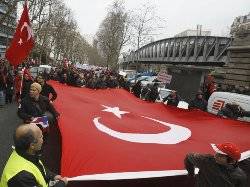Turkey has threatened retaliatory measures against France following a French senate vote approving a bill that would outlaw denial that the mass killings of Armenians in 1915 constituted genocide.
In a written statement following Monday's vote, Turkey's foreign ministry said: "We strongly condemn this decision which is... an example of irresponsibility."
"Politicizing the understanding of justice and history through other people's past and damaging freedom of expression in a tactless manner are first and foremost a loss for France."
Sadullah Ergin, Turkey's justice minister, said the bill, approved by 127 votes to 86 in the French upper house, was "a great injustice" that showed "a total lack of respect" for Turkey.
France's national assembly, the lower house of parliament, had already overwhelmingly voted in favor of the bill last month, prompting Ankara to freeze political and military ties with Paris, nominally its NATO ally.
The text will now be put to French President Nicolas Sarkozy, who is expected to approve it before parliament takes a break at the end of February ahead of the presidential election.
Tahsin Burcuoglu, Turkey's ambassador to France, said the bill was a "sensitive issue" that could prompt Ankara to downgrade diplomatic ties with Paris.
"Turkey will never accept such a law, and now everybody will pay a price, including Turkey, France, and the Armenian communities," he said.
"You can expect diplomatic relations will be at the level of charge d'affaires, not ambassador anymore."
Morning headlines in Turkish newspapers were anything but calm.
"A guillotine to free thought" said Star, while Aksam described the French move as "A guillotine to history".
"Shame on France" cried the Vatan daily. While Sozcu, a small newspaper that usually directs its scorn at Erdogan, found a new target with "Satan Sarkozy".
The mayor of Ankara has spoken of renaming the street where the French embassy is located to Algeria Street and erecting a memorial to Algerian victims of French colonial oppression in front of the embassy.
France has already recognized the killings as a genocide, but the new bill would go further, by punishing anyone who denied it with a year in jail and a fine of $57,000.
Ahmet Davutoglu, the Turkish foreign minister, who cancelled talks with European Union foreign ministers in Brussels on Iran's nuclear program pending the vote, said Ankara had already prepared its response.
"We have previously determined the steps to be taken if the bill is finally adopted. No one should doubt it," the state-run Anatolia news agency quoted Davutoglu as saying.
The passing of the bill through the French parliament has prompted street protests in Paris by Turks from France, Belgium, the Netherlands and Luxembourg, as well as diplomatic protests.
Recep Tayyip Erdogan, Turkey's prime minister, has accused Sarkozy of using the bill for electoral gain, in a bid to secure the votes of French Armenians before this year's election.
Armenia says that at least 1.5 million Armenians died under Ottoman rule when they were deported from eastern Anatolia to the Syrian desert and elsewhere in 1915 to 1916. They were killed or died from starvation or disease.
Turkey estimates the total to be about 300,000. It admits that atrocities were committed, but argues that there was no systematic attempt to destroy the Armenian people and that many people on both sides died amid the chaos of World War I, in which all sides suffered.
PHOTO CAPTION
Turkish citizens from France and other European countries demonstrate in Paris Saturday Jan. 21, 2012, to protest against a law that would make it a crime to deny "genocide" in Armenia.
Al-Jazeera


 Home
Home Discover Islam
Discover Islam Quran Recitations
Quran Recitations Lectures
Lectures
 Fatwa
Fatwa Articles
Articles Fiqh
Fiqh E-Books
E-Books Boys & Girls
Boys & Girls  Articles
Articles










